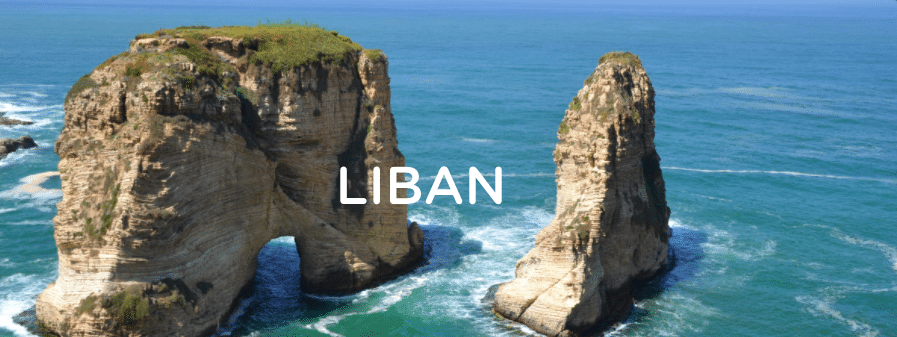|
| |
Le projet séparatiste séduit des politiques chrétiens. Longtemps attachée à l’unicité territoriale du Liban, la communauté chrétienne a, ces dernières semaines, par la voix de certaines de ses personnalités politiques, agité le spectre d’une séparation entre les régions à majorité chrétienne et les régions majoritairement composées d’autres confessions. Ce projet se heurte à la résistance du Hezbollah et à un faible intérêt occidental. L’alliance entre le Hezbollah et le Courant Patriotique Libre semble se diriger vers une fin douloureuse. En cause, de multiples points de divergence politiques entre les deux formations politiques qui, par leur alliance, ont dominé la vie politique libanaise de ces quinze dernières années. Le Liban a été classé par l’organisation internationale Transparency International à la 150e place, sur 180, des pays les plus corrompus pour la deuxième année consécutive.
The separatist project seems to be taking root in some Christian political spheres. Long attached to the territorial uniqueness of Lebanon, the Christian community has, in recent weeks, through the voice of some of its political figures, raised the specter of a separation between regions with a Christian majority and regions with a majority of other faiths. However, this project seems to meet fierce resistance from Hezbollah and little Western interest. The alliance between Hezbollah and the Free Patriotic Movement seems to be heading towards a painful end. This is due to the many points of political divergence between the two political formations which, through their alliance, have dominated Lebanese political life for the past fifteen years. Finally, and adding to the long list of disastrous records, Lebanon has been ranked by the international organisation Transparency International at the 150th place, out of 180, of the most corrupt countries for the second consecutive year.
|
|
|
|
| |
Info phare - Source médiatique |
|
|
|
| |
|
Un projet de séparation des communautés porté par des personnalités chrétiennes
Face à une crise économique sans précédent et à l’accumulation des tensions, un courant séparatiste prend de plus en plus d’ampleur dans la communauté chrétienne. Ce courant d’opinion - que beaucoup pensaient enterré avec les accords de Taëf qui ont mis fin à la guerre civile - prône une décentralisation voire une fédéralisation du Liban et une quasi-indépendance accordée aux régions à majorité chrétienne. Les tenants de ce projet savent qu’il ne pourra se concrétiser sans un appui international. Cela pousse des groupes politico-juridiques à demander l’appui de gouvernements occidentaux au nom du maintien d’une zone d’influence occidentale et de la protection des droits des chrétiens. Cependant, cette volonté séparatiste semble se heurter pour l’heure à une farouche opposition du Hezbollah et à un faible enthousiasme occidental.
|
|
Towards separation?
Faced with an unprecedented economic crisis and the accumulation of tensions, a separatist current is gaining momentum in the Christian community. This current of opinion, which many thought was buried with the Taef agreements that put an end to the civil war, advocates a decentralisation or even a federalisation of Lebanon and a quasi-independence granted to the Christian majority regions. However, the proponents of this project know that it cannot be achieved without international support, which is why many political and legal groups are now asking for the support of Western governments in the name of maintaining a limited but certain zone of Western influence and the protection of the Christian rights that these groups consider to be in danger. However, this separatist will seems to be met with fierce opposition from Hezbollah and little Western enthusiasm.
|
|
|
|
|
|
| |
|
Entre le CPL et le Hezbollah, rien ne va plus
L’alliance entre le Hezbollah chiite et le Courant Patriotique Libre (CPL), plus grand parti chrétien du Liban en 2005, a rythmé la vie politique pendant plus de 16 ans. Cette alliance profita aux deux partis. Le CPL a eu la possibilité de faire élire son leader historique, Michel Aoun, au poste de Président de la République et le Hezbollah a pu profiter d’une couverture politique nationale du plus grand parti chrétien en nombre de députés et marginaliser les oppositions qui souhaitent son désarmement. Cependant, dès l’année 2018, les premiers sujets de dissension apparaissent entre les deux partis. Parmi ces sujets, celui des critiques du CPL à l’égard du président du Parlement, Nabih Berry, figure majeure du chiisme politique libanais et que le Hezbollah refuse d’abandonner au nom de l’unité intra chiite. Les principales oppositions sont apparues durant les derniers mois du mandat du Président Michel Aoun. Elles portent, d’une part, sur le soutien clair apporté à Sleiman Frangié pour le poste de président de la République au détriment de Gebran Bassil, gendre de l’ex-Président Michel Aoun et nouvel homme fort du CPL et d’autre part, sur la participation du Hezbollah à un Conseil des ministres présidé par le Premier ministre sortant Najib Mikati malgré l’absence d’élection d’un nouveau président de la République. L’alliance entre les deux partis semble aujourd’hui très fragile.
|
|
Towards an end of the alliance between Hezbollah and the CPL
The alliance between the Shiite Hezbollah and the Free Patriotic Movement (FPM), the largest Christian party in Lebanon in 2005, has set the pace of political life for more than 16 years.
This alliance benefited both parties. The CPL was able to elect its historical leader, Michel Aoun, as President of the Republic and Hezbollah was able to benefit from the national political coverage of the largest Christian party in terms of number of deputies and to marginalise the opposition that wanted its disarmament.
However, from 2018, the first issues of dissension appear between the two parties. Among these issues, the CPL's criticism of the President of the Parliament, Nabih Berry, a major figure of Lebanese political Shiism and which Hezbollah refuses to abandon in the name of intra-Shiite unity. The main oppositions appeared during the last months of the mandate of President Michel Aoun. They concern, on the one hand, the clear support given to Sleiman Frangié for the post of President of the Republic to the detriment of Gebran Bassil, son-in-law of former President Michel Aoun and new strong man of the CPL and, on the other hand, the participation of Hezbollah in a Council of Ministers chaired by the outgoing Prime Minister Najib Mikati despite the absence of an election of a new President of the Republic.
The alliance between the two parties seems very fragile today.
|
|
|
|
|
|
| |
|
Les évêques maronites appellent les députés à prendre leurs responsabilités
Dans le cadre de leur réunion mensuelle, les évêques maronites ont réitéré leur appel à l’élection rapide d’un nouveau président de la République qui succéderait au président Michel Aoun. Les évêques maronites ont par ailleurs fait porter la responsabilité de l’effondrement que vit le pays sur les députés qui, par leur inertie, retardent l’élection d’un nouveau président. Enfin, les évêques ont appelé les responsables concernés à éloigner l'enquête sur l’explosion du port de Beyrouth des tensions politiques et à poursuivre l'enquête jusqu’à l’émission de l’acte d’accusation.
|
|
Maronite bishops call on MPs to take responsibility
During their monthly meeting, the Maronite bishops reiterated their call for the rapid election of a new President of the Republic to succeed President Michel Aoun. The Maronite bishops also put the responsibility for the collapse of the country on the deputies who, by their inertia, are delaying the election of a new president. Finally, the bishops called on those responsible to distance the investigation into the Beirut port explosion from political tensions and to continue the investigation until the indictment is issued.
|
|
|
|
|
|
| |
|
Sayyed Fadlallah demande l’élection d’un président
Dans le cadre de son sermon du vendredi, Sayyed Ali Fadlallah a affirmé que le pays se dirigeait dangereusement vers un chaos qui pourrait mettre en péril son intégrité, sa sécurité et inciter sa population à des départs massifs. Le dignitaire chiite a ainsi réitéré son appel à l’élection d’un président de la République, condition nécessaire à une sortie de crise.
|
|
Sayyed Fadlallah calls on MPs and politicians to get the country out of the crisis
In his Friday sermon, Sayyed Ali Fadlallah said that the country was heading dangerously towards chaos that could jeopardise its integrity, its security and incite its population to massive departures. The Shiite dignitary thus reiterated his call for the election of a president of the Republic, a necessary condition for a way out of the crisis.
قال السيد علي فضل الله في خطبة الجمعة ان «البلد يسير بخطى سريعة نحو كارثة حقيقية تهدد كيانه وأمنه واستقرار أبنائه فيه»، داعيا الى أن «تبادر القوى السياسية إلى استنفار جهودها من أجل معالجة ما يجري نجد إمعانا في اللامبالاة وترك الحبل على غاربه، حيث تستمر المراوحة القاتلة على هذا الصعيد ولم تنفع كل الجهود التي تبذل ولا الضغوط التي تمارس ولا مناشدات الداخل والخارج للاسراع بانتخاب رئيس للجهورية الذي يمثل الممر الإلزامي للخروج من النفق الذي دخلنا إليه (…)”.
|
|
|
|
|
|
| |
|
Le Liban reste l’un des pays les plus corrompus
Dans son rapport annuel pour 2022, Transparency International classe le pays du cèdre parmi les pays les plus corrompus de la planète. À la 150e place sur 180, le Liban est au même niveau de corruption que l’Afghanistan ou que le Nigéria et maintient sa position de 2021. Parmi les causes justifiant ce mauvais classement qui jauge le niveau de corruption du secteur public, peuvent être cités : le vol par les fonctionnaires des fonds destinés à la reconstruction ou le fait pour les responsables publics d’échapper à tout contrôle de leurs actions. Jugeant insuffisante la loi anti-corruption votée en 2020, l’organisation internationale estime que les conflits dans le pays risquent de s’aggraver sans réformes politiques fondamentales pour venir à bout de la corruption et atténuer l’impact des crises.
|
|
Lebanon at the forefront of corruption
In its annual report for 2022, Transparency International ranks the country of the cedar among the most corrupt countries in the world.
At 150th place out of 180, Lebanon is at the same level of corruption as Afghanistan or Nigeria and maintains its 2021 position.
Among the reasons for this low ranking, which gauges the level of corruption in the public sector, are the theft of reconstruction funds by civil servants and the fact that public officials escape any control over their actions.
The international organisation said that the anti-corruption law passed in 2020 was insufficient and that conflicts in the country were likely to worsen without fundamental policy reforms to tackle corruption and mitigate the impact of crises.
|
|
|
|
|
|
| |
This newsletter is written by Pharos Observatory, an observatory of cultural and religious pluralism, as part of its assessment study of religious pluralism in the Near and Middle East. It gathers information, analyses and speeches which may not reflect Pharos Observatory's feeling about the situation, but which should be taken into account as part of the analysis. All recipients, who are Pharos Observatory partners, are encouraged to contribute to this Watch by sharing any information that is worthwhile and fit to print. Ce bulletin de veille est réalisé par l’Observatoire Pharos, observatoire du pluralisme des cultures et des religions, dans le cadre de sa mission d’étude de la situation du pluralisme au Proche et au Moyen-Orient. Il rassemble des informations, analyses et déclarations qui ne reflètent pas systématiquement la perception de la situation par l’Observatoire Pharos, mais qui constituent des documents à intégrer dans l’analyse. Les destinataires, partenaires de l’Observatoire Pharos, sont invités à contribuer à la qualité de cette veille par le partage de toutes informations utiles et diffusables.
|
|
|
|




